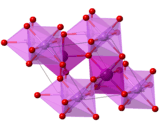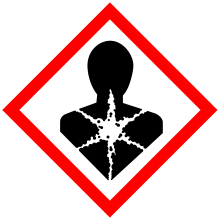Lithium iodate
 | |
 | |
| Names | |
|---|---|
| IUPAC name
Lithium iodate | |
| Identifiers | |
| 13765-03-2 | |
| ChemSpider | 141432 |
| EC-number | 237-365-2 |
| |
| Jmol-3D images | Image |
| PubChem | 3084149 |
| |
| UN number | 1479 |
| Properties | |
| Molecular formula |
ILiO3 |
| Molar mass | 181.84 g·mol−1 |
| Appearance | White hygroscopic crystals |
| Odor | Odorless |
| Density | 4.487 g/cm3[1] |
| Melting point | 420–450 °C (788–842 °F; 693–723 K)[1][2][3] |
| Anhydrous: 89.4 g/100 mL (10 °C) 82.7 g/100 mL (25 °C) 78.4 g/100 mL (40.1 °C) 73 g/100 mL (75.6 °C)[1] Hemihydrate: 80.2 g/100 mL (18 °C)[4] | |
| Solubility | Insoluble in EtOH[2] |
| Thermal conductivity | 1.27 W/m·K (a-axis) 0.65 W/m·K (c-axis)[1] |
| Refractive index (nD) |
1.8875 (20 °C) 1.6 (RT) nHe–Ne: 1.8815 (20 °C)[1] 1.5928 (RT)[5] |
| Structure | |
| Crystal structure | Hexagonal,[2] hP10[6] |
| Space group | P6322, No. 182[6] |
| Point group | 622[6] |
| Lattice constant | a = 5.46(9) Å, c = 5.15(5) Å[6] |
| Lattice constant | α = 90°, β = 90°, γ = 120° |
| Hazards | |
| GHS pictograms |    [7] [7] |
| GHS signal word | Danger |
| H272, H315, H319, H335, H360[7] | |
| P201, P220, P261, P305+351+338, P308+313[7] | |
| EU classification | |
| R-phrases | R8, R36/37/38, R61 |
| S-phrases | S17, S22, S36/37/39, S45, S53 |
| NFPA 704 | |
| Except where noted otherwise, data is given for materials in their standard state (at 25 °C (77 °F), 100 kPa) | |
| | |
| Infobox references | |
Lithium iodate (LiIO3) is a negative uniaxial crystal[1] for nonlinear, acousto-optical and piezoelectric applications. It has been utilized for 347 nm ruby lasers.[8][9]
Properties
Mohs hardness of lithium iodate is 3.5–4. Its linear thermal expansion coefficient at 298 K (25 °C; 77 °F) is 2.8·10−5/°C (a-axis) and 4.8·10−5/°C (c-axis).[1] Its transition to β-form begin at 50 °C (122 °F) and it is irreversible.[3]
References
- ↑ 1.0 1.1 1.2 1.3 1.4 1.5 1.6 Rarely Used and Archive Crystals. Nonlinear Optical Crystals: A Complete Survey. 2005. pp. 364–368. doi:10.1007/0-387-27151-1_8. ISBN 978-0-387-27151-4.
- ↑ 2.0 2.1 2.2 Lide, David R., ed. (2009). CRC Handbook of Chemistry and Physics (90th ed.). Boca Raton, Florida: CRC Press. ISBN 978-1-4200-9084-0.
- ↑ 3.0 3.1 Teyssier, Jeremie; Dantec, Ronan Le; Galez, Christine; Mugnier, Yannick; Bouillot, Jacques; Plenet, Jean-Claude (2003-11-20). "LiIO3 nanocrystals in SiO2 xerogels, a new material for non-linear optics". Proceeding SPIE 5222 (26). doi:10.1117/12.507309.
- ↑ Seidell, Atherton; Linke, William F. (1919). Solubilities of Inorganic and Organic Compounds (2nd ed.). New York: D. Van Nostrand Company. p. 374.
- ↑ Polyanskiy, Mikhail. "Refractive index of LiIO3 (Lithium iodate) - Herbst-o". http://www.refractiveindex.info''. Retrieved 2014-08-08.
- ↑ 6.0 6.1 6.2 6.3 Zachariasen, W.H.; Olof, F.A. BartaLars (1931-06-15). "Crystal Structure of Lithium Iodate". Physical Review Letters 37: 1626. doi:10.1103/PhysRev.37.1626.
- ↑ 7.0 7.1 7.2 Sigma-Aldrich Co., Lithium iodate. Retrieved on 2014-08-08.
- ↑ Risk, W. P.; Gosnell, T. R.; Nurmikko, A. V. (9 January 2003). Compact Blue-Green Lasers. Cambridge University Press. p. 123. ISBN 978-0-521-52103-1. Retrieved 13 December 2012.
- ↑ Nikogosyan, David N. (4 January 2005). Nonlinear Optical Crystals: A Complete Survey. Springer. p. 371. ISBN 978-0-387-22022-2. Retrieved 13 December 2012.
| ||||||||||||||
